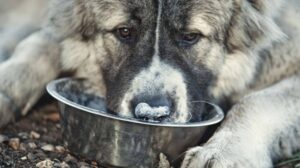
Is Honey Safe for Dogs to Eat, or Is It Harmful?
What’s sweet and sticky but also healthy? Honey and its healing properties are a subject of differing opinions. Honey is generally not harmful for adults. What about your four legged friend? Can dogs eat honey? Is it harmful to them?
Honey is a good food for dogs. Honey is high in sugar, so it should only be consumed in small amounts by your dog, if he’s healthy and fully-grown. Honey’s healing effects have not been proven scientifically. In case you are unsure, do not just rely on the positive effects of honey, but consult your veterinarian.
What are the risks and dangers of using honey on dogs?
Honey can be fatal to infants, as the intestinal flora in their intestines is still developing. Honey contains the Clostridium Botulinum bacteria, which is still not able to be fought off. The same principle applies to dogs. Honey should not be administered to puppies and quadrupeds who have weakened immune systems.
Ask your vet for advice if you’re unsure, such as if your dog has been sick in the past. Ask your vet if you are unsure whether or not to give honey to your dog if it has diabetes or is obese. If in doubt, you should not give honey to your dog. Honey in excess can also cause tooth decay in dogs.
What type of honey can dogs consume? How much honey can dogs eat?
If you are giving your dog honey to support their health or healing, it is important that you choose a natural product. Pure honey is not heated, filtered or treated with additives.
To be safe, you should buy honey from a beekeeper directly or at a store that sells regional products. Manuka honey is produced in New Zealand, southeast Australia and has special antibacterial properties. It is also more expensive and must travel a long way before it can reach our local stores. Honey of other types can also be used to treat your dog in the same way, but only in small amounts.
One teaspoon of honey has about 60 calories, and 17 grams sugar. You should never give your dog more honey than one teaspoon per day. It’s best to give him less. Honey can be given to your dog in its pure form or mixed into his food.
Honey for dogs: Application areas
Honey is not only rich in vitamins but also has a reputed healing effect on a variety of areas. These claims are not backed up by scientific evidence, so you should consult your veterinarian before taking any action.
Some dog owners swear honey can help alleviate allergies in your pet. It is believed that if your dog suffers from pollen allergies, he will benefit from honey produced in the same region as the pollen. There is a chance that your dog may develop immunity, and display fewer or even no allergy symptoms. There is no evidence that this is true. This principle is the basis of the hyposensitization treatment for allergies. However, you should not do this on your own.
Honey can reduce arthritis in dogs, according to some studies.
Honey is known to heal wounds and combat skin diseases. It has a dehydrating action that speeds up the healing process. This increases cell division, which in turn speeds wound healing. You do not feed your dog honey; instead, dab some on the wound or rash.
* Stimulate metabolism. Honey contains amylase which breaks down starch and can help your dog to digest its food. Constipation or bloating may be signs that your dog is ill or not able to tolerate his food. As a precautionary measure, you should consult a veterinarian to confirm this symptom before giving honey to your dog.
Honey can also be used to treat kennel-cough.
Kennel-cough is a dog disease that should only be treated by your veterinarian. It is not recommended to use honey as a treatment for kennel-cough at home, since there is no evidence that it works. Honey may help to alleviate your dog’s cough, but you should consult with a vet first.

